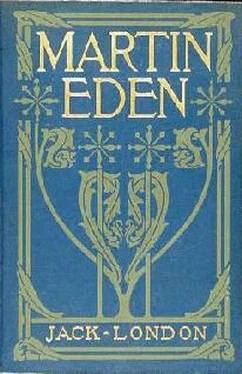"Make it up with him," he advised Lizzie, at parting, as they stood in front of the workingman’s shack in which she lived, near Sixth and Market. He referred to the young fellow whose place he had usurped that day.
"I can’t– now," she said.
"Oh, go on," he said jovially. "All you have to do is whistle and he’ll come running."
"I didn’t mean that," she said simply.
And he knew what she had meant.
She leaned toward him as he was about to say good night. But she leaned not imperatively, not seductively, but wistfully and humbly. He was touched to the heart. His large tolerance rose up in him. He put his arms around her, and kissed her, and knew that upon his own lips rested as true a kiss as man ever received.
"My God!" she sobbed. "I could die for you. I could die for you."
She tore herself from him suddenly and ran up the steps. He felt a quick moisture in his eyes.
"Martin Eden," he communed. "You’re not a brute, and you’re a damn poor Nietzscheman. You’d marry her if you could and fill her quivering heart full with happiness. But you can’t, you can’t. And it’s a damn shame."
"‘A poor old tramp explains his poor old ulcers,’" he muttered, remembering his Henly. "‘Life is, I think, a blunder and a shame.’ It is-a blunder and a shame."
"The Shame of the Sun" was published in October. As Martin cut the cords of the express package and the half-dozen complimentary copies from the publishers spilled out on the table, a heavy sadness fell upon him. He thought of the wild delight that would have been his had this happened a few short months before, and he contrasted that delight that should have been with his present uncaring coldness. His book, his first book, and his pulse had not gone up a fraction of a beat, and he was only sad. It meant little to him now. The most it meant was that it might bring some money, and little enough did he care for money.
He carried a copy out into the kitchen and presented it to Maria.
"I did it," he explained, in order to clear up her bewilderment. "I wrote it in the room there, and I guess some few quarts of your vegetable soup went into the making of it. Keep it. It’s yours. Just to remember me by, you know."
He was not bragging, not showing off. His sole motive was to make her happy, to make her proud of him, to justify her long faith in him. She put the book in the front room on top of the family Bible. A sacred thing was this book her lodger had made, a fetich of friendship. It softened the blow of his having been a laundryman, and though she could not understand a line of it, she knew that every line of it was great. She was a simple, practical, hard-working woman, but she possessed faith in large endowment.
Just as emotionlessly as he had received "The Shame of the Sun" did he read the reviews of it that came in weekly from the clipping bureau. The book was making a hit, that was evident. It meant more gold in the money sack. He could fix up Lizzie, redeem all his promises, and still have enough left to build his grass-walled castle.
Singletree, Darnley Co. had cautiously brought out an edition of fifteen hundred copies, but the first reviews had started a second edition of twice the size through the presses; and ere this was delivered a third edition of five thousand had been ordered. A London firm made arrangements by cable for an English edition, and hot-footed upon this came the news of French, German, and Scandinavian translations in progress. The attack upon the Maeterlinck school could not have been made at a more opportune moment. A fierce controversy was precipitated. Saleeby and Haeckel indorsed and defended "The Shame of the Sun," for once finding themselves on the same side of a question. Crookes and Wallace ranged up on the opposing side, while Sir Oliver Lodge attempted to formulate a compromise that would jibe with his particular cosmic theories. Maeterlinck’s followers rallied around the standard of mysticism. Chesterton set the whole world laughing with a series of alleged non-partisan essays on the subject, and the whole affair, controversy and controversialists, was well-nigh swept into the pit by a thundering broadside from George Bernard Shaw. Needless to say the arena was crowded with hosts of lesser lights, and the dust and sweat and din became terrific.
"It is a most marvellous happening," Singletree, Darnley Co. wrote Martin, "a critical philosophic essay selling like a novel. You could not have chosen your subject better, and all contributory factors have been unwarrantedly propitious. We need scarcely to assure you that we are making hay while the sun shines. Over forty thousand copies have already been sold in the United States and Canada, and a new edition of twenty thousand is on the presses. We are overworked, trying to supply the demand. Nevertheless we have helped to create that demand. We have already spent five thousand dollars in advertising. The book is bound to be a record-breaker."
"Please find herewith a contract in duplicate for your next book which we have taken the liberty of forwarding to you. You will please note that we have increased your royalties to twenty per cent, which is about as high as a conservative publishing house dares go. If our offer is agreeable to you, please fill in the proper blank space with the title of your book. We make no stipulations concerning its nature. Any book on any subject. If you have one already written, so much the better. Now is the time to strike. The iron could not be hotter."
"On receipt of signed contract we shall be pleased to make you an advance on royalties of five thousand dollars. You see, we have faith in you, and we are going in on this thing big. We should like, also, to discuss with you the drawing up of a contract for a term of years, say ten, during which we shall have the exclusive right of publishing in book-form all that you produce. But more of this anon."
Martin laid down the letter and worked a problem in mental arithmetic, finding the product of fifteen cents times sixty thousand to be nine thousand dollars. He signed the new contract, inserting "The Smoke of Joy" in the blank space, and mailed it back to the publishers along with the twenty storiettes he had written in the days before he discovered the formula for the newspaper storiette. And promptly as the United States mail could deliver and return, came Singletree, Darnley Co.’s check for five thousand dollars.
"I want you to come down town with me, Maria, this afternoon about two o’clock," Martin said, the morning the check arrived. "Or, better, meet me at Fourteenth and Broadway at two o’clock. I’ll be looking out for you."
At the appointed time she was there; but shoes was the only clew to the mystery her mind had been capable of evolving, and she suffered a distinct shock of disappointment when Martin walked her right by a shoe-store and dived into a real estate office. What happened thereupon resided forever after in her memory as a dream. Fine gentlemen smiled at her benevolently as they talked with Martin and one another; a type-writer clicked; signatures were affixed to an imposing document; her own landlord was there, too, and affixed his signature; and when all was over and she was outside on the sidewalk, her landlord spoke to her, saying, "Well, Maria, you won’t have to pay me no seven dollars and a half this month."
Maria was too stunned for speech.
"Or next month, or the next, or the next," her landlord said.
She thanked him incoherently, as if for a favor. And it was not until she had returned home to North Oakland and conferred with her own kind, and had the Portuguese grocer investigate, that she really knew that she was the owner of the little house in which she had lived and for which she had paid rent so long.
Читать дальше












